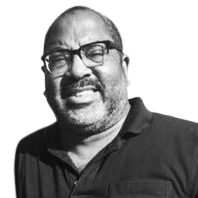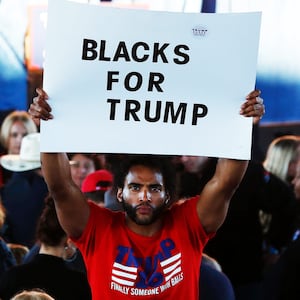It was a Saturday morning at a Black barbershop when a conversation between two strangers waiting for cuts shook Wayne Riley so much that he “almost jumped out of the barber’s seat” in the middle of his hair cut.
“Oh we can’t get that Chinese shit,” one man says to another, shortly after the arrival of the coronavirus in New York had been announced.
Riley, the first African American president of the board of the 170-year-old New York Academy of Medicine and the president of Brooklyn's Downstate Medical Center, couldn’t resist throwing himself into the conversation, knowing from early reports from China that COVID-19 was hard-hitting for people with hypertension, diabetes, obesity, and lung problems.
“No, dudes, this can hurt us,” shouted Riley, also the former president of Meharry Medical College, one of the nation’s four historically Black medical schools. “Brothers, how many of you have family members with diabetes and high blood pressure?”
With that opening question, Riley’s audience ballooned to the entire shop.
“How many of you have family with lung problems?”
As hands flew up and heads were shaking in agreement, his barber paused from the cut so Riley could continue to deliver his message. “Brothers, that’s why we have to take this seriously, because so many Black people basically have a family member with a preexisting condition or have one themselves.”
Nine months later, Riley is turning his evangelistic attention to tackling African American distrust of the COVID vaccines, as “we, the Black community, started with a deficit of understanding of how adversely impactful COVID-19 was going to be. Fast forward to now, where it is clear that we have at least two effective vaccines. I looked at the data and the trials that have tested the effectiveness of this vaccine. Black lives matter, but science matters to Black lives. So we have to understand the scientific progress.”
He continues: “We should seize the moment, as Black and brown communities. We should argue forcefully that we have to be at the front of the line after health-care workers. Black and brown communities should be very near the top for this vaccine once it's made available.”
But Riley’s message faces a huge obstacle: distrust of the vaccinations among African Americans. According to a survey about vaccine hesitancy from the NAACP and the COVID Collaborative, 48 percent of Black Americans say that they know someone who has been hospitalized or died from the virus, yet just 14 percent say they mostly or completely trust that a vaccine will be safe. Other surveys and polls also show that Black people are less likely than other groups to have faith in the vaccines, which is why many Black doctors across the country have embraced the challenge of promoting the vaccine as crucial for a community that has been hit disproportionately hard by the virus.
“I feel like a weight is on our shoulders,” says Dr. Monique Hamilton, an OB-GYN in New Orleans. “We have to educate people so that we can get the community vaccinated. We have a big responsibility.”
COVID education has become the dominant agenda of the Atlanta chapter of the National Medical Association, an organization of Black doctors. Next month, the chapter is hosting a town hall with representatives of Pfizer and Moderna. “We understand why they don't trust the government when they say to get a vaccine,” says Dr. Frank K. Jones, president of the Atlanta chapter. “We understand that people are afraid, but the best way to address that is through education. I do sense that just of the people that I've talked to, I'd say greater than 50 percent are very hesitant about getting the vaccination and I'm not surprised.”

The history of the medical mistreatment of African Americans dates back to slavery. It is a history littered with horrors, most notably the Tuskegee Experiment in which Black men were not given treatment for syphilis in order for scientists and researchers to see what the natural progression of the disease would be. “Tuskegee was a horrible disaster for Black folks in Alabama in the ’30s, ’40s, ’50s and ’60s,” says Riley. “I say we have to let go of Tuskegee in this era of COVID, because COVID is killing us.”
However some physicians say African Americans should not be rushed into the front of the vaccination line. “I'm definitely going to get the vaccine as a physician and a professional,” says Dr. Darryl Fortson, a physician at an Urgent Care Center in Las Vegas.
“But I’m not gonna be first in line. First of all, I'm at a high risk of being exposed, I need to protect myself. Second of all, I owe it to my patients and family to protect myself, and third of all, as a community leader in the health-care arena, I need to set an example to protect myself but I still need to know that this vaccine is safe and that no group of individuals including myself or my community are being used as lab rats.”
As a young boy, Fernando Daniels was called “nutty professor” because of his affinity for academics. That nickname never bothered him. However, when Daniels became a teenager, he was horrified by the name other kids had given his brother, Michael, who was five years younger.
“Kojak,” he says. “They were making fun of my brother because bald heads weren’t in back then. And man, I was really mad one time. So there was a bottle in the trash can, I broke the bottle and was ready to fight those kids. And Michael said, ‘Fernando, let it be, man, they don’t know what’s wrong with me. Shame on them. They don’t know I’m dying from leukemia.’”
Daniels came of age in Augusta, Georgia, in the 1970s amidst his brother’s battle with cancer. Four months before Michael’s death at age 15, he would amplify his big brother’s ambition in a conversation over Christmas dinner. “Fernando, you can be a doctor, just do this.”

Michael Daniels
Courtesy of Fernando DanielsToday Daniels, an emergency medicine physician at Howard University Hospital, is on the front line of COVID and has never seen anything like this in his 16 years at the hospital. “Every time you walk in a room to take care of a person, you’re putting your life on the line,” he says. “Last week, I was emotionally spent. Because I’m looking at my patients in the room with COVID who are great people, who are great fathers and mothers, who are sick as hell. I got ones we sent to the ICU that may not live. Some have died in the room from COVID.”
Witnessing the pain of COVID up front has erased much of his own trepidation over the vaccine. “I understand the feelings and people’s reservations,” Daniels says. “We have to convince people that this is a different day and help people get through the tough questions. For minorities, the biggest question is ‘Are they going to experiment on me again?’ And ‘Is this vaccine going to work on people that look like you and I?’ And many people have told me simply, ‘I’m afraid to take it.’”
In a way, the fear is a reminder of that “foul smell” in his neighborhood in Augusta and the thoughts he can’t escape surrounding his brother’s health. How much was Michael’s death impacted by the environmental factors of Augusta? By the time Daniels was finishing medical school in the ’80s, the story of Hyde Park, a Black Augusta neighborhood, was on the verge of being discovered as a classic case of environmental racism as toxins and other contaminants were found in the soil and water. Growing up, Daniels lived less than a mile away from Hyde Park, surrounded by a toxic dump and seven factories.
Places like Hyde Park form the reference points of the American experience for many African Americans, along with the Tuskegee experiment. Daniels brings an understanding of that perspective into his arsenal as he attempts to fight the vaccine hesitancy and to convince people to get in line when the time comes.
“We have an option to increase our survival, and we just got to take that chance, man. This thing has ravaged families, destroyed families. It has wiped out families. If there’s something that can slow that process down and give people the chance to live their normal lifespans, it’s worth the chance.”







